Are you considering bringing a wirehaired dachshund into your life? These adorable pups are known for their distinct appearance, charming personalities, and incredible loyalty to their families. Originally bred in Germany for hunting badgers, dachshunds have become one of the most beloved breeds around the world.
Wirehaired dachshunds are a unique variation of the breed, with their distinctive scruffy coat and fearless personality. If you’re looking for a dog that’s both cuddly and adventurous, the wirehaired dachshund may be the perfect choice for you. In this breed guide, we’ll explore everything you need to know about wirehaired dachshunds, from their history and personality to their care and training needs. So, whether you’re a longtime fan of dachshunds or just starting to consider adding one to your family, read on to discover all you need to know about this lovable breed.
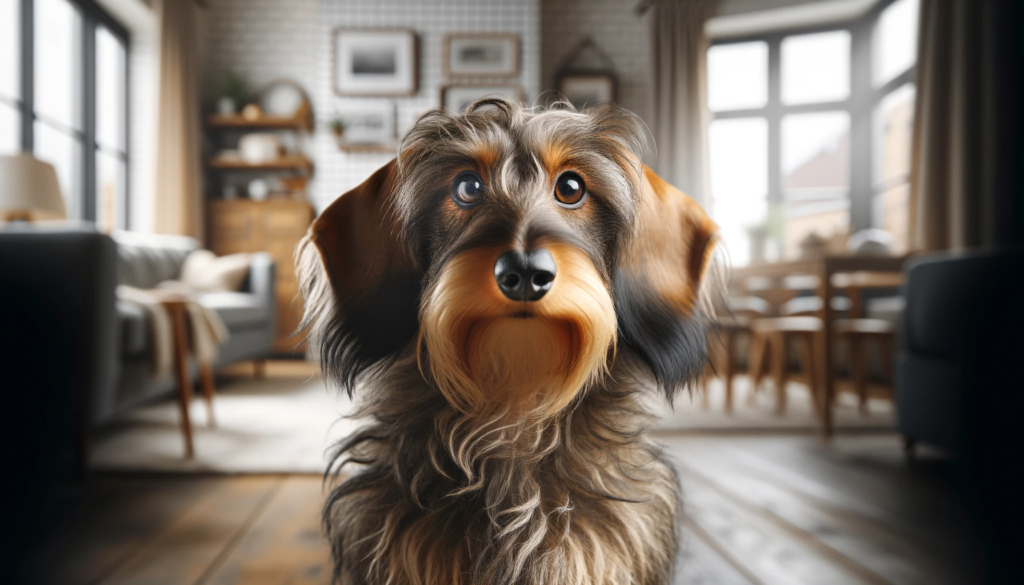
What Colors Do Wirehaired Dachshunds Come In?
Wirehaired dachshunds come in a variety of colors and patterns. The most common colors include:
- Wild Boar: a mix of black, brown, and gray hairs
- Black and Tan: black with tan markings on the face, chest, and legs
- Chocolate and Tan: chocolate brown with tan markings
- Dapple: a unique pattern of light and dark spots, often with one dominant color (such as black and tan dapple or red dapple)
- Brindle: a pattern of black stripes on a lighter background (such as red or cream)
It’s important to note that not all colors are recognized by breed standards, and some colors may be more rare than others. When selecting a miniature wirehaired dachshund, it’s important to focus on finding a reputable breeder who prioritizes the health and well-being of their dogs over certain coat colors or patterns.

Wireharied Daschund Temperament
Wirehaired dachshunds are known for their lively and spirited temperament. They are intelligent, curious, and can be quite stubborn at times. Due to their hunting background, they have a strong prey drive and love to dig and explore.
These dogs are also affectionate and loyal to their owners, making them great family pets. They often have a protective nature and can be wary of strangers, which makes them good watchdogs.
Wirehaired dachshunds thrive on human companionship and require plenty of attention and exercise to prevent boredom and destructive behavior. They do well with training and socialization from a young age, as they can be quite independent and headstrong.
Overall, wirehaired dachshunds make wonderful companions for those who are willing to provide them with the attention and exercise they need. Their lively personality and affectionate nature make them a joy to be around.
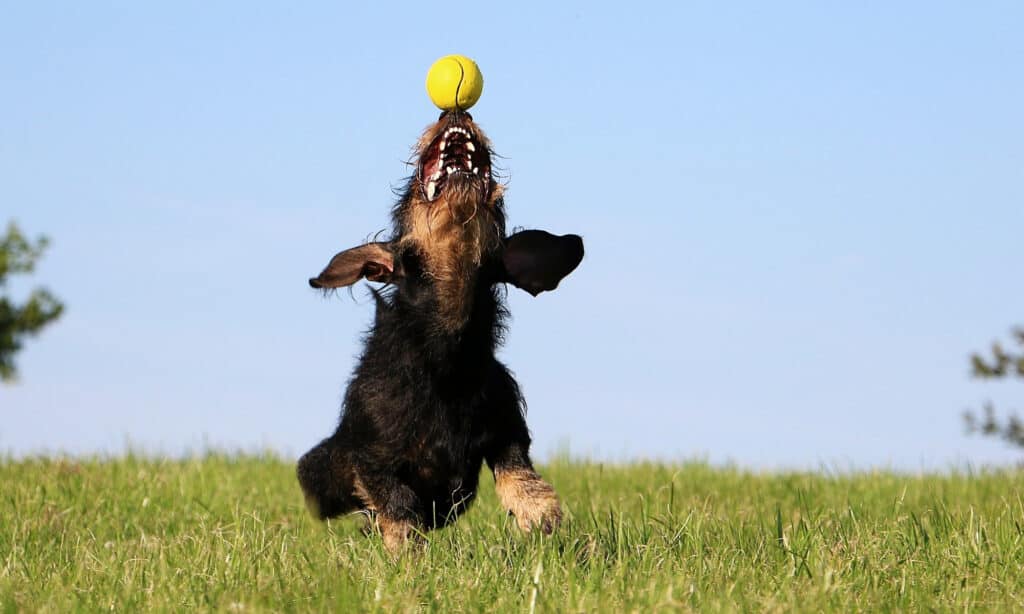
History of the Wirehaired Dachshund
The wirehaired dachshund breed originated in Germany in the 19th century, where they were initially bred for hunting small animals like badgers and rabbits. They were created by crossing smooth dachshunds with other breeds, such as the wirehaired pinscher, to develop a dog with a thick, wiry coat that could handle rough terrain.
During World War I, wirehaired dachshunds were utilized as messenger dogs and guard dogs. Their popularity quickly grew in Germany and eventually spread throughout Europe and the United States as well.
Today, wirehaired dachshunds are still considered great hunting dogs, but they also make wonderful family pets. Their unique personality and rich history have made them a beloved breed among dog lovers around the world.
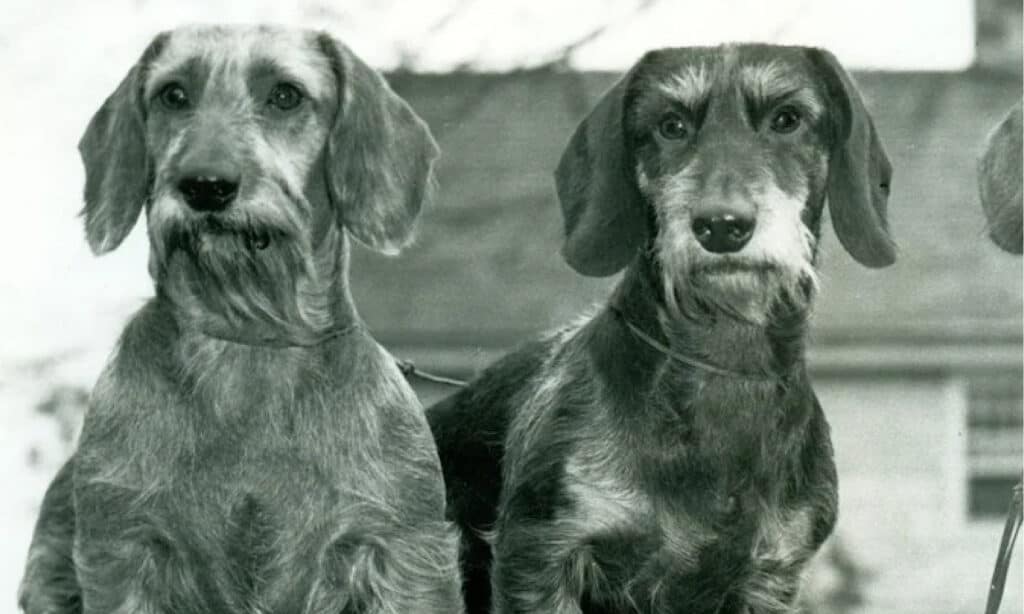
What Sizes Do Wirehaired Dachshunds Come In?
Wirehaired dachshunds come in two sizes: standard and miniature. Standard wirehaired dachshunds typically weigh between 16-32 pounds and stand about 8-9 inches tall at the shoulder. Miniature wirehaired dachshunds weigh between 8-11 pounds and stand about 5-6 inches tall at the shoulder. Despite their size difference, both types share the same spunky and loving personality that has made them such a beloved breed.
Should You Choose To Rescue or Purchase a Wirehaired Dachsund?
If you’re considering getting a wirehaired dachshund, one of the first decisions you’ll need to make is whether to adopt a rescue dog or purchase from a breeder. Both options have their pros and cons, so it’s important to consider your lifestyle and preferences before making a decision.
Rescuing a wirehaired dachshund can be a great choice if you’re looking to give a dog in need a loving home. Many rescue dogs are already housebroken and have some basic training, which can make the transition to your home easier. Additionally, rescuing a dog can be a more affordable option than purchasing from a breeder.
On the other hand, purchasing from a reputable breeder can ensure that you get a dog with a known background and good health history. Breeders can also provide valuable information and guidance on raising and training your wirehaired dachshund. However, purchasing from a breeder can be more expensive and may take more time to find the right match.
Ultimately, the decision to rescue or purchase a wirehaired dachshund is a personal one that should be made based on your individual circumstances and preferences. No matter which option you choose, providing a loving home for a wirehaired dachshund is a wonderful decision that can bring joy and companionship to both you and your new furry friend.
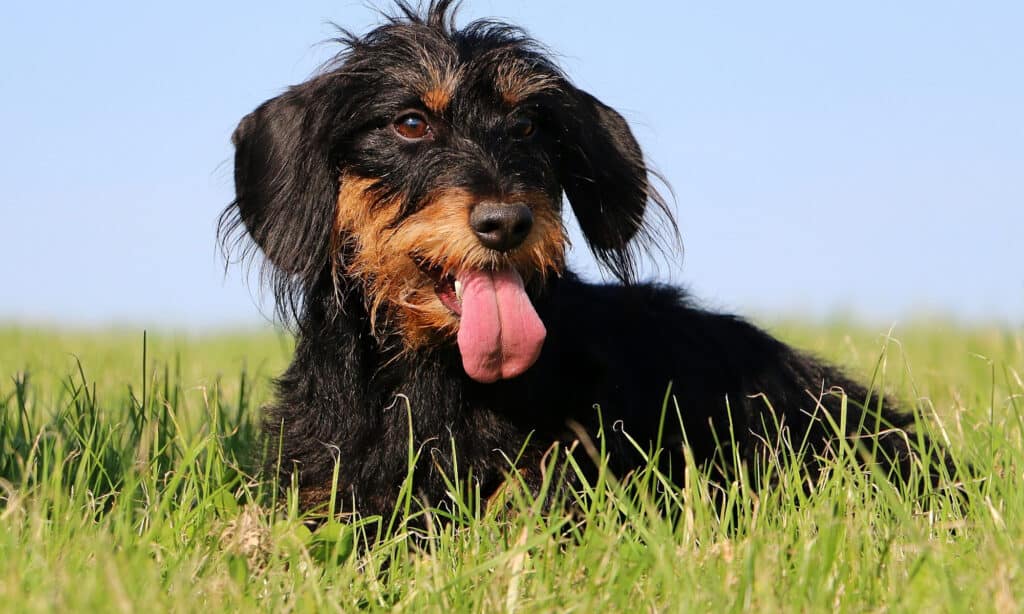
What Should You Look For if Purchasing a Wirehaired Dachshund?
When looking to purchase a wirehaired dachshund, it is important to consider several factors to ensure that you are getting a healthy and happy dog. Here are some things to look for when purchasing a wirehaired dachshund:
- Reputable breeder: It is important to purchase your dog from a reputable breeder who prioritizes the health and well-being of their dogs. Look for breeders who are registered with kennel clubs and have a good reputation within the community.
- Health screening: Make sure that the breeder has conducted health screening tests on the parents of the litter to rule out any genetic health issues that could be passed down to the puppies.
- Temperament: Observe the temperament of the puppies and the parents to make sure they have a good temperament and are a good fit for your lifestyle.
- Physical appearance: Look for a puppy with a healthy and shiny coat, bright eyes, and clean ears. Avoid puppies that appear lethargic or have discharge from their eyes or nose.
- Documentation: Make sure that the breeder provides you with documentation, such as vaccination records and health certificates, to ensure that the puppy is up-to-date on their vaccinations and has a clean bill of health.
By taking these factors into consideration when purchasing a wirehaired dachshund, you can increase the chances of finding a healthy and happy companion that will bring joy to your life for years to come.
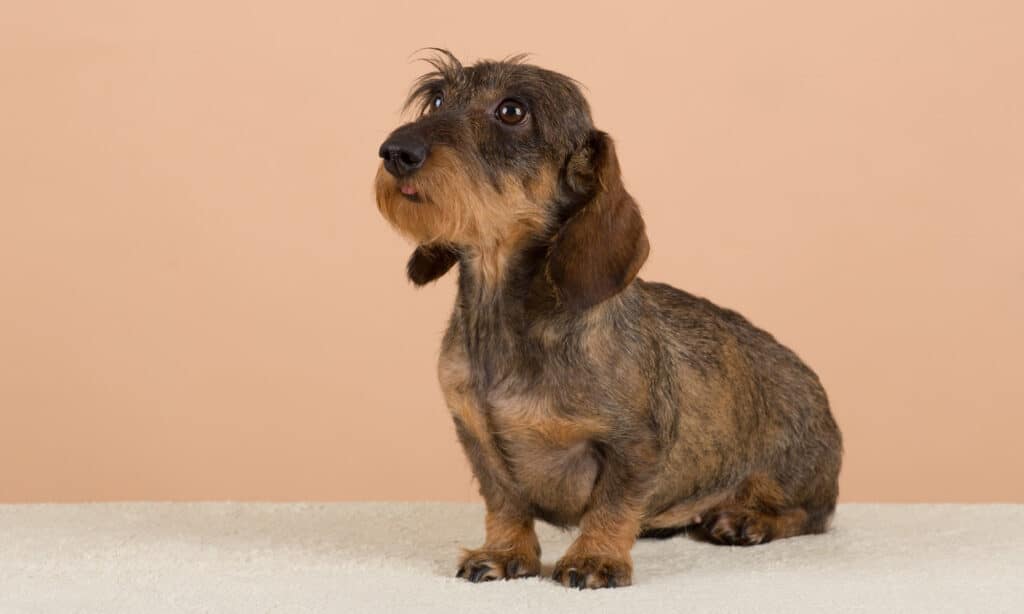
How Much Does a Wirehaired Dachshund Cost?
Wirehaired dachshunds are an adorable breed that are loved by many. If you’re considering bringing one into your family, it’s important to be aware of the potential costs. On average, wirehaired dachshund puppies can cost anywhere from $500 to $2,500, depending on a number of factors such as location, breeder reputation, and pedigree.
It’s important to keep in mind that the upfront cost of purchasing a wirehaired dachshund is just the beginning. When considering the total cost of owning a dog, one should factor in ongoing expenses like food, grooming, and veterinary care. It’s important to do your research and choose a reputable breeder or rescue organization to ensure that you are getting a healthy and well-socialized dog that will be a loving companion for years to come.
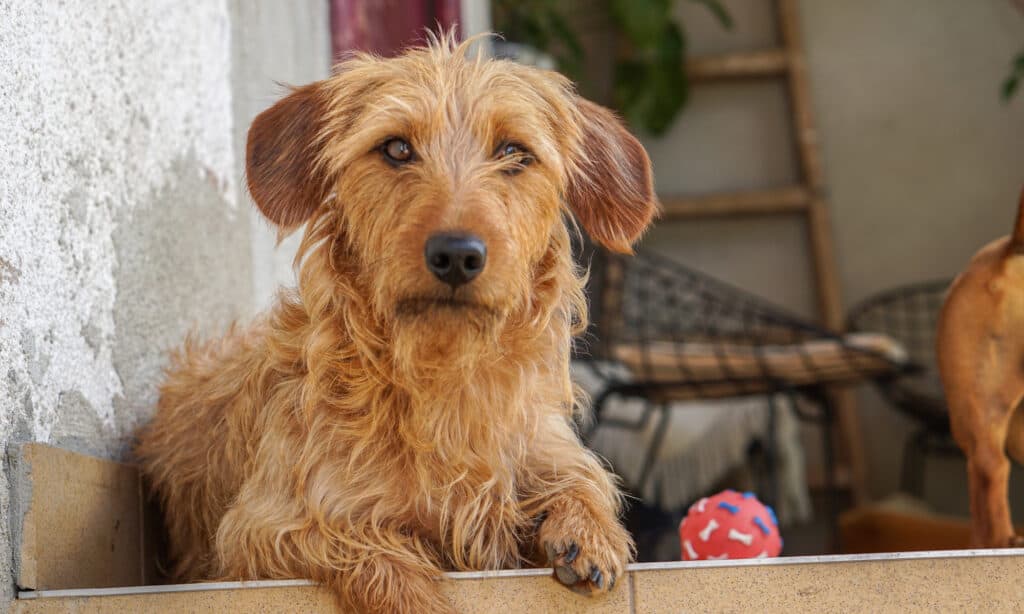
Are Wirehaired Dachshunds Healthy?
Wirehaired Dachshunds are generally a healthy breed, but they can still be prone to certain health issues. Here are some of the most common conditions that affect this breed:
- Intervertebral Disc Disease (IVDD): This is a spinal cord condition that can occur in any type of Dachshund, but it is more common in the long-backed varieties, including the Wirehaired Dachshund. IVDD can range from mild to severe and can cause back pain, hind limb paralysis, and even loss of bladder and bowel control.
- Progressive Retinal Atrophy (PRA): This is a degenerative eye disease that can lead to vision loss and blindness in dogs. PRA is an inherited condition that can affect Wirehaired Dachshunds. There is no cure for PRA, but early detection through regular eye exams can help slow its progression.
- Patellar Luxation: This is a condition where the kneecap (patella) can dislocate from its normal position. This can cause lameness and pain in affected dogs. Patellar luxation is more common in small breeds, including the Wirehaired Dachshund.
- Canine Diabetes: Wirehaired Dachshunds are at a higher risk of developing diabetes than other breeds. Canine diabetes is a condition where the body is unable to regulate blood sugar levels properly. Symptoms can include increased thirst, increased urination, and weight loss.
- Obesity: Wirehaired Dachshunds are prone to obesity, which can lead to a range of health issues, including joint problems, diabetes, and heart disease. It’s important to feed your dog a balanced diet and ensure they get enough exercise to maintain a healthy weight.
Regular veterinary checkups and preventive care can help catch these conditions early and provide the best chance for successful treatment.
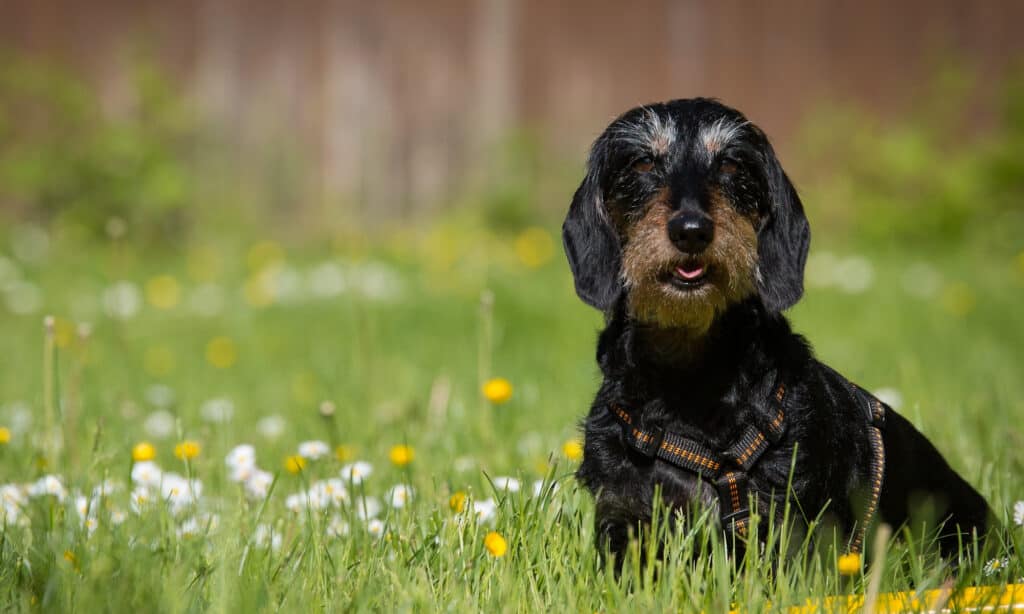
What is the Lifespan of a Wirehaired Dachshund?
Wirehaired dachshunds are generally healthy dogs with a lifespan of around 12-16 years. However, like all breeds, they can be prone to certain health issues such as hip dysplasia, eye problems, and ear infections. It’s important to make sure you are buying from a reputable breeder who performs health screenings on their breeding dogs to reduce the risk of passing on genetic health problems. It’s also important to take your wirehaired dachshund to the vet regularly for checkups and to keep up with preventative care. With proper care and attention, your wirehaired dachshund can lead a long and healthy life by your side.
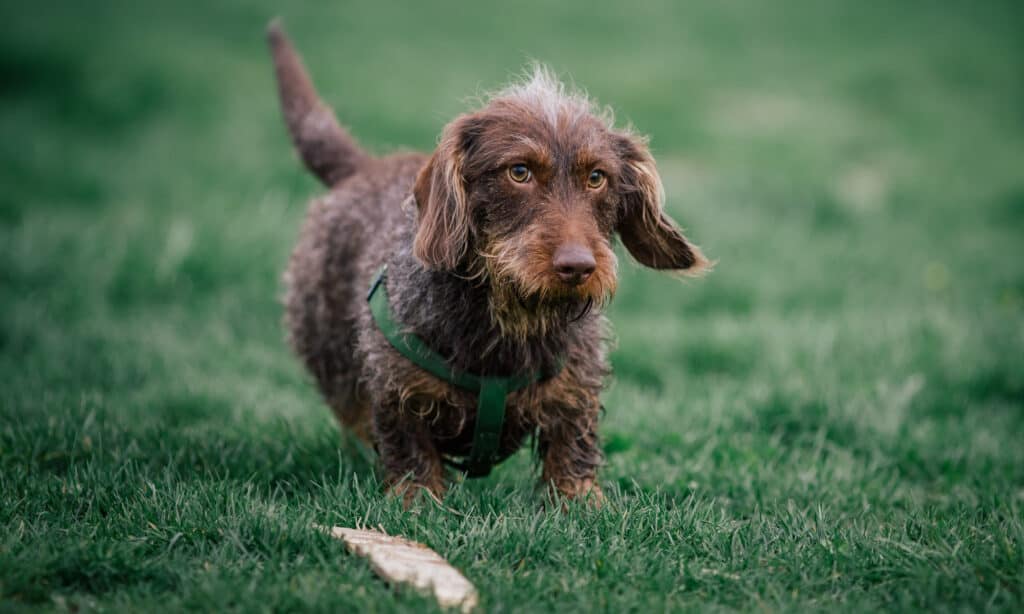
Nutrition For Wirehaired Dachshunds
When it comes to feeding your wirehaired dachshund, it’s important to prioritize whole, fresh foods in their diet. This means including plenty of lean protein sources like chicken, fish, and beef, as well as a variety of fruits and vegetables. Feeding your dog a diet that consists mainly of highly processed kibble can lead to health issues like obesity, digestive problems, and a dull coat.
Whole foods provide more of the vital nutrients, enzymes, and fiber that dogs need to thrive, and can help maintain their overall health and wellness. Additionally, many dogs have food sensitivities or allergies, and feeding them fresh, whole foods can be a great way to avoid triggering these issues.
Of course, it’s important to consult with your veterinarian before making any significant changes to your dog’s diet. But in general, incorporating whole, fresh foods into your wirehaired dachshund’s meals can be a great way to support their health and ensure they live a long, happy life.
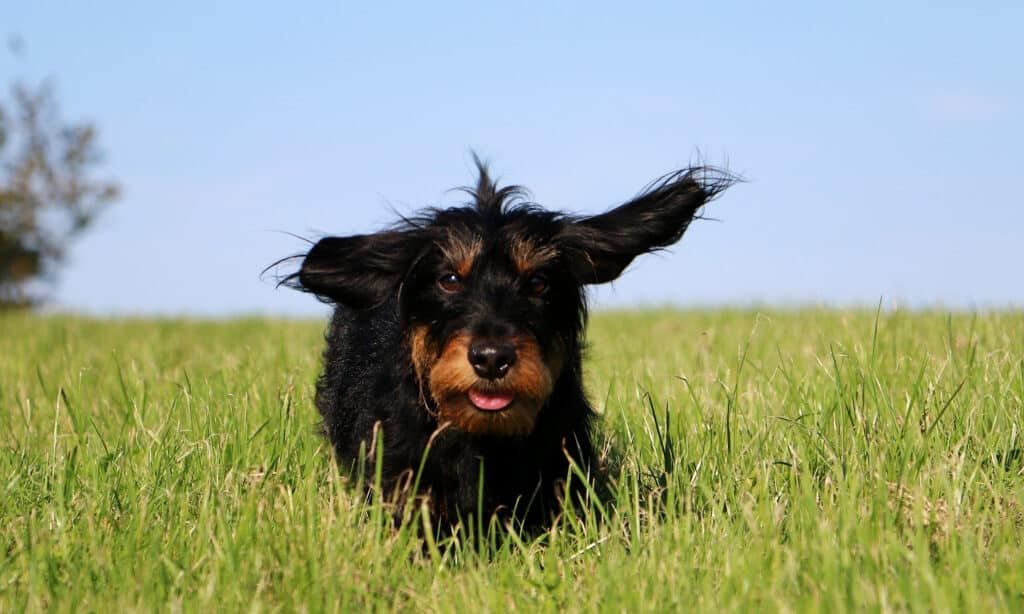
Exercise and Physical Activity for Miniature Wirehaired Dachshunds
Wirehaired Dachshunds are an active breed that require regular exercise and physical activity to stay healthy and happy. The breeders originally bred these dogs to hunt badgers, which resulted in them having a lot of energy and a high prey drive. Here are some things to keep in mind when it comes to exercise and physical activity for Wirehaired Dachshunds:
- Daily walks: It’s important to take your Wirehaired Dachshund for daily walks to keep them physically fit and mentally stimulated. A good rule of thumb is to aim for at least 30 minutes of exercise per day, but this can vary depending on the individual dog’s age, health, and energy level.
- Mental stimulation: In addition to physical exercise, it’s important to provide your Wirehaired Dachshund with mental stimulation to prevent boredom and destructive behavior. This can include training sessions, puzzle toys, and games of fetch or hide-and-seek.
- Avoid high-impact activities: Due to their long backs, Wirehaired Dachshunds are prone to back problems and spinal injuries. It’s important to avoid high-impact activities like jumping or running up and down stairs to prevent injury.
- Supervised playtime: If you have a backyard or access to a dog park, supervised playtime can be a great way to provide your Wirehaired Dachshund with exercise and socialization. However, it’s important to always supervise playtime to ensure your dog doesn’t overexert themselves or get into fights with other dogs.
Overall, regular exercise and physical activity are essential for the health and well-being of Wirehaired Dachshunds. Just be sure to tailor the exercise routine to your individual dog’s needs and limitations to prevent injury.
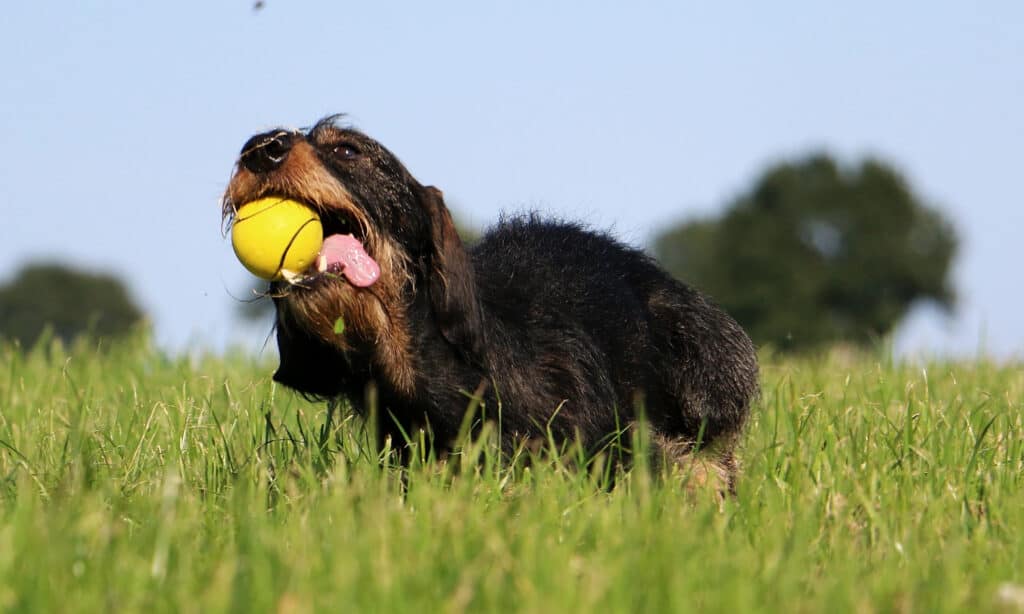
Grooming Requirements for Miniature Wirehaired Dachshunds
Wirehaired Dachshunds have a distinct coat that requires regular grooming to keep it looking and feeling its best. Here are some things to keep in mind when it comes to grooming your Wirehaired Dachshund:
- Brushing: Wirehaired Dachshunds have a coarse, wiry coat that requires regular brushing to prevent matting and tangling. Brush your dog at least once a week, and consider using a slicker brush or pin brush to remove loose hair and debris. You may also want to consider using a comb to work through any knots or tangles.
- Stripping: Wirehaired Dachshunds have a double coat, with a soft undercoat and a coarse topcoat. In order to maintain the proper texture and appearance of the coat, many Wirehaired Dachshund owners choose to strip their dog’s coat several times a year. Stripping involves plucking out dead hairs by hand or with a stripping knife.
- Bathing: Although some other breeds may require more frequent bathing, Wirehaired Dachshunds can still benefit from occasional baths to maintain a healthy and clean coat. Aim to bathe your dog every 2-3 months, or as needed if he gets particularly dirty or smelly. Use a mild, dog-specific shampoo and be sure to rinse thoroughly to avoid any residue.
- Nail trimming: Like all dogs, Wirehaired Dachshunds need to have their nails trimmed regularly to prevent them from becoming too long and causing discomfort or even injury. Aim to trim your dog’s nails every 4-6 weeks, or as needed if you can hear them clicking on hard floors.
- Ear cleaning: Wirehaired Dachshunds have long, floppy ears that can be prone to infections if not kept clean and dry. Check your dog’s ears regularly for signs of redness, swelling, or discharge, and clean them as needed with a damp cloth or cotton ball.
By following these grooming guidelines, you can help your Wirehaired Dachshund look and feel his best. Regular grooming not only keeps your dog healthy and comfortable, but it also provides a great opportunity for bonding and quality time together.
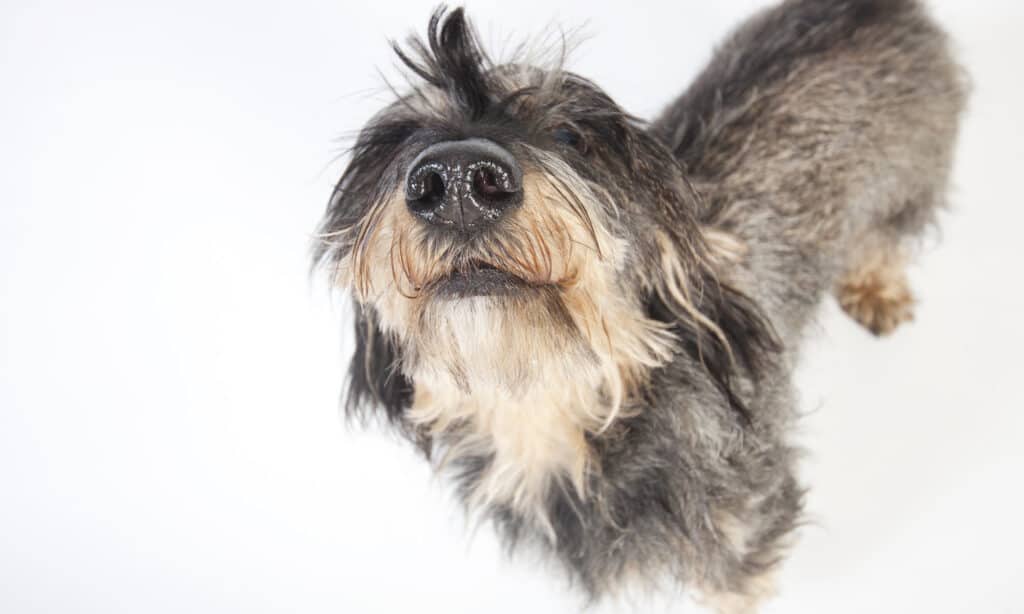
Are Wirehaired Dachshunds Hard to Train?
Wirehaired Dachshunds can be stubborn and independent, which can make them challenging to train. However, with patience, consistency, and positive reinforcement, they can be trained successfully. Early socialization and obedience training are important to ensure they develop good behavior and respond well to commands. It’s also essential to keep training sessions short and fun to maintain their interest and focus. Working with a professional dog trainer or attending obedience classes can also be beneficial for both the dog and the owner.
Most Common Behavior Issues of Wirehaired Dachshunds
Wirehaired Dachshunds, like any other breed, can develop certain behavior issues if they are not properly trained and socialized. Here are some of the most common behavior issues that can be seen in Wirehaired Dachshunds:
- Separation anxiety: Wirehaired Dachshunds tend to bond very closely with their owners. They can become anxious and distressed when left alone for extended periods of time. This can lead to destructive behavior and excessive barking.
- Aggression: Some Wirehaired Dachshunds may show aggression towards other dogs or strangers. Especially if they are not properly socialized from a young age.
- Excessive barking: Wirehaired Dachshunds are known to be vocal and can become excessive barkers if not trained properly.
- Fearfulness: Some Wirehaired Dachshunds can develop fearfulness towards certain people or situations, which can lead to defensive behavior.
- Digging and escaping: Wirehaired Dachshunds were originally bred for hunting and they have a strong instinct to dig and explore. If not provided with enough mental stimulation, they may dig up the yard or try to escape from the home.
It is important to address any behavior issues early on and work with a professional trainer if necessary. With proper training and socialization, Wirehaired Dachshunds can make wonderful and well-behaved companions.
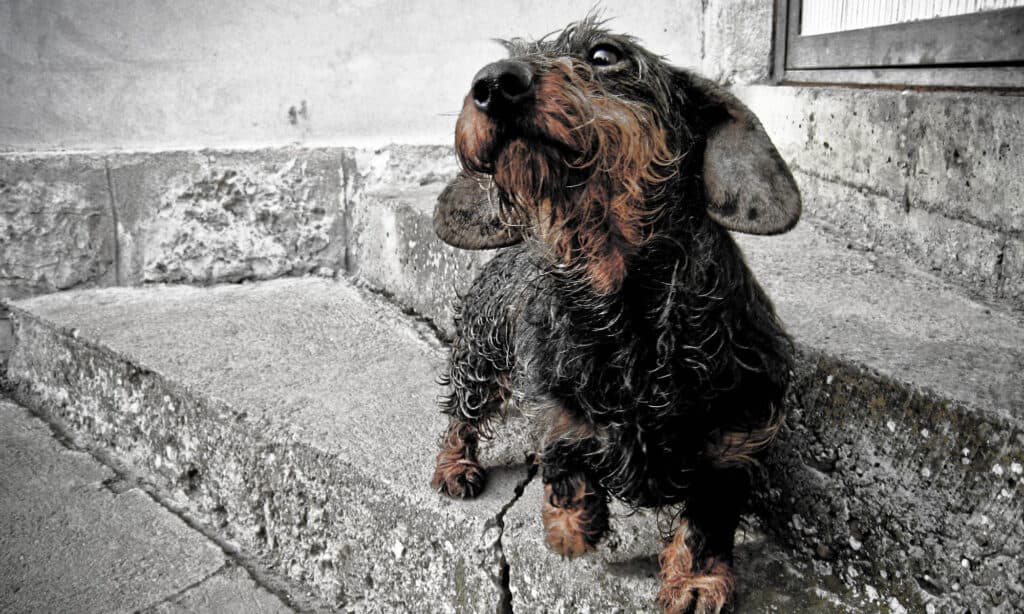
Training Tips for Wirehaired Dachshunds
Wirehaired Dachshunds are intelligent and eager to please, but they can also be stubborn and strong-willed. Training them requires patience, consistency, and positive reinforcement. Here are some tips to help you train your Wirehaired Dachshund:
- Start Early: Begin training your Wirehaired Dachshund as early as possible. Socialization and obedience training should start at around 8 weeks old.
- Positive Reinforcement: Use positive reinforcement techniques such as treats, praise, and toys to motivate. Reward your Wirehaired Dachshund for good behavior.
- Consistency: Be consistent with your training methods and commands. Use the same cues and rewards each time to avoid confusion.
- Short Training Sessions: Keep training sessions short (5-10 minutes) and frequent. This will help your Wirehaired Dachshund stay focused and engaged.
- Exercise: Give your Wirehaired Dachshund plenty of exercise to help them burn off excess energy and stay focused during training.
- Be Patient: Remember that Wirehaired Dachshunds can be stubborn and may require extra patience and persistence during training. Don’t get discouraged and stay positive.
- Seek Professional Help: If you’re struggling with training your Wirehaired Dachshund. Don’t hesitate to seek professional help from a certified dog trainer.
With consistent training, patience, and positive reinforcement, your Wirehaired Dachshund can become a well-behaved and well-adjusted companion.
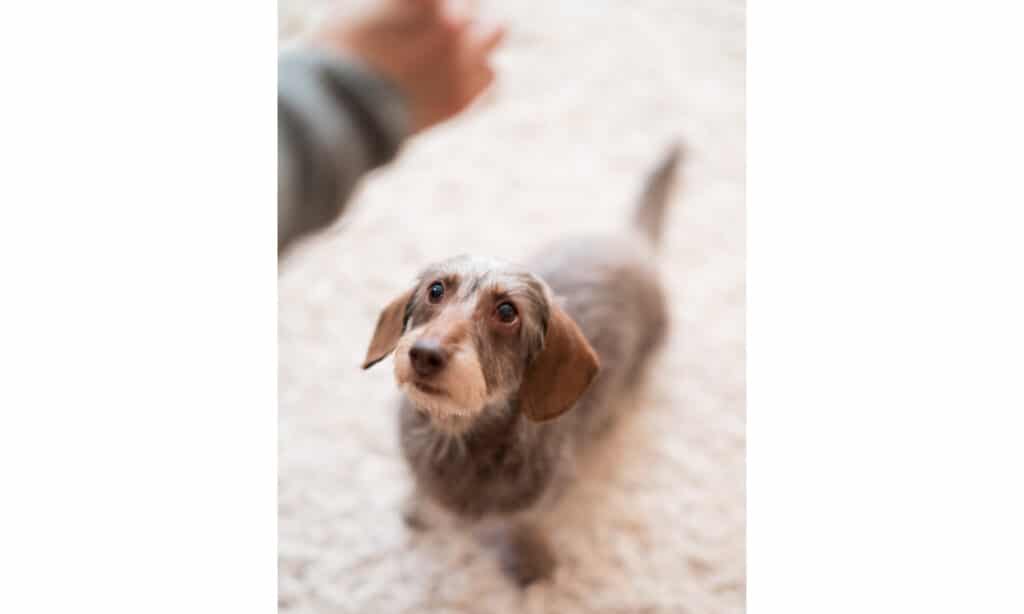
Conclusion
Wirehaired Dachshunds are a unique and delightful breed known for their loyalty, intelligence, and charming personalities. Their history, temperament, health concerns, and grooming needs make them a great choice for families who are willing to provide them with the proper care and attention they deserve. With their energetic nature and love for playtime, these pups require daily exercise and mental stimulation to maintain their physical and mental well-being. Proper training and socialization from an early age can help prevent common behavior issues that may arise. When it comes to feeding, a whole food-based diet can help promote optimal health and longevity. Whether you’re considering adopting or purchasing a Wirehaired Dachshund, or already have one as a beloved companion, they will undoubtedly bring joy and companionship to your life for many years to come.
~Lindsie
